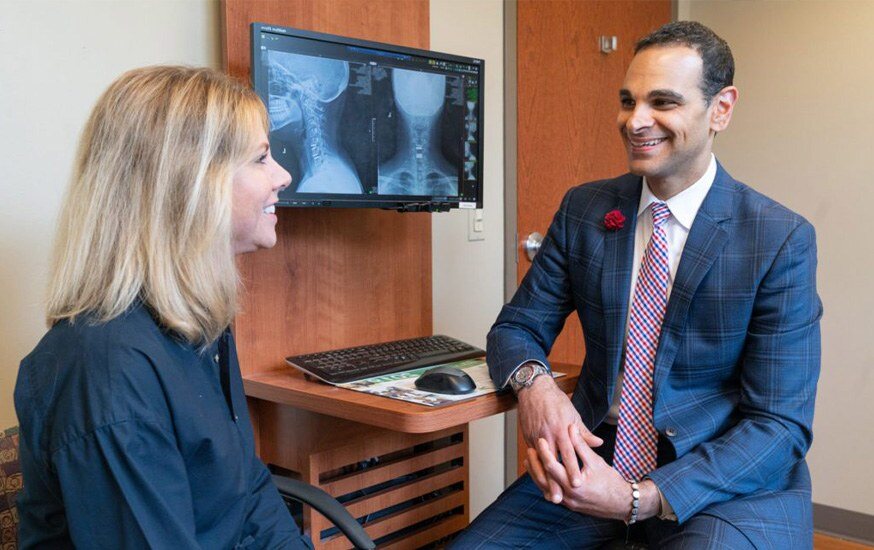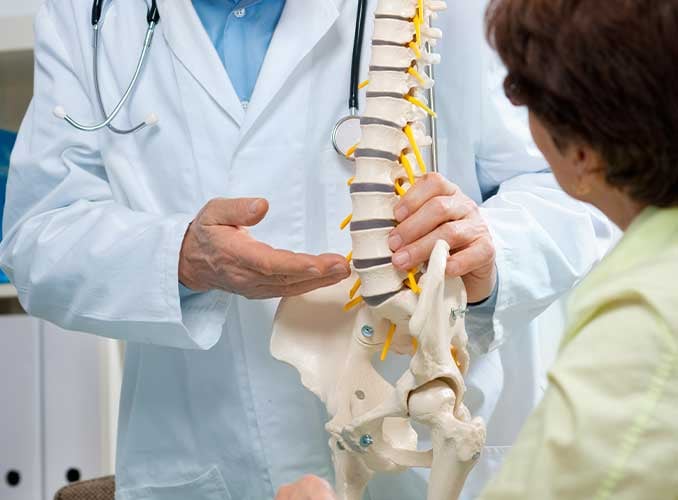Ultimate Guide to Neck and Back Pain Relief
Discover common injuries and conditions related to spine disorders, and learn when to see a specialist about remedies for neck and back pain.
This guide covers:
Life has enough challenges. Don’t let neck or back pain be one of them.
Patients of all ages can develop acute injuries and chronic conditions that affect the spine. The best back doctors use their knowledge and experience to recommend minimally invasive treatments and advanced technologies that help patients find neck and back pain relief so they can regain physical strength, mobility, and confidence.
Keep reading to find out about treatment options for getting neck and back pain relief to help you feel better and move better.

Download the Ultimate Guide to Neck and Back Pain Relief

Chronic Neck and Back Pain Symptoms
If you’ve had neck and back pain that affects your comfort, disturbs your sleep, or makes it difficult to perform day-to-day activities, you may have chronic neck and back pain that requires either lower back or upper back pain relief.
Chronic neck and back pain symptoms can be caused by problems with discs, joints, nerves, ligaments, or muscles. Your symptoms can vary. You may feel a dull occasional ache, stiffness, sharp, stabbing pain, or shooting pain. It could be localized or travel from one area of the back to another. In certain conditions, it can travel down your legs.
There are several ways you can try to treat back pain and neck pain at home. You might get neck and back pain relief with ice, heat, over-the-counter pain medication, stretching, or rest.
If none of these provides you with remedies for neck and back pain, it might be a good time to see a spine physician. A skilled doctor can offer a wide range of customized treatment options that don’t necessarily require surgery.
FAQ: Signs of Neck and Back Pain
If there has been no change and no improvement in your neck or back pain after three weeks, it may be time to see a spine specialist. It is essential not to try to diagnose the specific cause of your neck or back pain on your own. Any time you are concerned about your pain, you should see an expert.
If you are not sure if you should see a back doctor, there are specific warning signs that you should watch for. If you develop severe radiating arm or leg (nerve) pain, if you can’t fully straighten your back, if your spine can’t support you, or if you have any leg or arm weakness in association with your nerve pain, you should immediately call an orthopedic physician or visit orthopedic immediate care.
A specialist will diagnose your condition and devise a treatment plan specifically for you. In mild cases, treatment can be performed at home. Most spine conditions can be treated with conservative measures such as anti-inflammatory medications, physical therapy exercises, or even spinal injections. Only the most severe problems require a surgical solution, which is typically a last resort.
Anyone can suffer from spine pain for a multitude of reasons. IBJI treats patients of all ages with neck and back pain, whether it’s a sports injury, arthritis, underlying disease, pain from carrying excess weight, or other causes.

What Causes Spine Pain
From a slipped disc or pinched nerve to a spinal fracture, there are many causes of neck and back pain, and thankfully, many minimally invasive surgical options for neck and back pain relief. Causes of chronic neck and back pain may include age, trauma—such as a fall or sports injury—or overuse, like years of bending on the job.
Dr. William P. Mosenthal reveals the connections between different symptoms—ranging from stabbing and burning pains to tingling sensations and muscle aches—to different spine injuries and conditions.
Back Stress
Carrying excess weight, often in the last trimester of pregnancy, can put added stress on your back, sending you on a search for neck and back pain relief treatment. Tension from stress, even emotional stress, can cause neck or back pain.
Sports-Related Injuries
Athletes who participate in high-contact sports like basketball, hockey, or soccer can suffer an acute injury that requires immediate neck and back pain relief. Repetitive activities can sometimes cause overuse stress in athletes. One treatment option is a steroid injection in the spine, an effective spine discomfort treatment.
Age-Related Neck and Back Pain
Many diseases and conditions that directly result from aging and deterioration of the bones and discs can cause neck and back pain. These can range from mild and occasional neck and back pain to acute symptoms that can be incapacitating.
Below are some common neck and back pain causes that require neck and back pain relief treatments administered by a qualified back doctor.
Degenerative Disc Disease
Degenerative disc disease occurs as we age, typically affecting people in the 30- to 50-year-old patient population.
Over time, the discs wear out and break down, reducing the amount of inner cushioning between the vertebrae. This cushioning gel-like material can sometimes squeeze out. This can affect local nerves that become inflamed and painful. Patients often need neck and back pain relief from degenerative disc disease.
Herniated Disc
A herniated disc is a type of degenerative disc disease. Your disc or discs may be ruptured, bulging, or protruding, which may cause compression of a nerve. This can occur in any of the 24 bones that make up the spine.
Although this can be very painful, there are non-surgical treatments that can provide neck pain or neck and back pain relief within a few weeks.
Sciatica (Radiculopathy)
If you’re feeling a shooting pain that travels down your leg, you may have a herniated disc causing radiculopathy, or what is more commonly known as sciatica pain. A bulging disc can press directly on a nerve which contributes to the sciatic nerve resulting in numbness, tingling, or leg weakness.
Some of the options treating for sciatica pain that can provide the neck and back pain relief you need include injections, physical therapy, and spine surgery.
Explore Options for Effective At-Home Sciatica Pain Relief
Muscle or Ligament Strain or Sprain
Have you ever overstretched a muscle or tendon? This action can cause you to partially or fully tear the muscle tissue, resulting in a strain or sprain.
You can treat most of these injuries at home by following the RICE approach (Rest, Ice, Compression, and Elevation). However, you may require surgery if you experience back pain after a severe tear (after lifting something heavy, falling, twisting the wrong way, after an accident or sports injury, and even sometimes sneezing).
Osteoarthritis
According to the CDC, the pain, aching, stiffness, and decreased range of motion caused by osteoarthritis affects over 32.5 million adults in the United States. Osteoarthritis risk factors include joint injury or overuse, age, gender, obesity, genetics, and race. Numerous therapies can help you achieve neck pain or back pain relief.
Spinal Stenosis
Another common pain ailment caused by age is spinal stenosis. Back pain from spinal stenosis can affect your sleep. A narrowed spinal canal with a thickened ligament is to blame, but several treatments are available to correct this and provide back pain relief, including minimally invasive lumbar decompression.
Dr. Craig Forsthoefel explains what causes spinal stenosis, how it’s treated, and what you can do to prevent it.
Fibromyalgia
The National Institute of Arthritis and Musculoskeletal and Skin Diseases defines fibromyalgia as a chronic (long-lasting) disorder that causes pain and tenderness throughout the body.
More women are affected by it than men, and the chance of getting it increases with age. Even though there is no cure, neck pain, and back pain relief options are available under the care of our board-certified pain management specialists.
Ankylosing Spondylitis
This type of arthritis can cause pain and stiffness in the lower back and hips. Patients commonly feel pain in the morning and after periods of inactivity.
Men are more likely than women to develop it. You can find back pain relief for ankylosing spondylitis through our board-certified rheumatologists.
Spondylolisthesis
This condition occurs when vertebrae in the back slip or shift out of place. This can be due to degenerative conditions, fractures, or injuries to the vertebrae. Caused by either genetics or overuse, spondylolisthesis requires back pain relief treatment.
Depending on the severity, it can present as muscle strain, radiating pain to the buttocks, low back pain, and numbness/tingling, among other sensations.
Meet Erica, a patient diagnosed with lordosis and spondylolisthesis at age 12, who’s now leading an active, pain-free life, thanks to expert care from IBJI’s Dr. Steven M. Mardjetko.
Compression Fractures/Osteoporosis
Older patients can commonly experience spinal fractures resulting from a weakened skeletal system, sometimes caused by osteoporosis. Back pain is felt near the fracture and can get worse with movement. Severe fractures can additionally cause radiating pain down the legs.
Scoliosis
Adolescent scoliosis typically doesn’t cause back pain, but adult degenerative scoliosis can cause problems requiring back pain relief. In severe cases of scoliosis where mobility is limited or back pain relief is desired, there are life-changing surgical options, including spinal fusion surgery.
Get Tips to Help You Move Better and Live Better With Scoliosis
Sacroiliac Joint Dysfunction
Problems in the SI joints, located between the pelvic bones, can cause pain in the lower back, buttocks, and legs. Spinal injections often can provide long-lasting back pain relief.
FAQ: Neck and Back Pain Causes
If you had a recent fall or accident, your neck or back pain might be caused by the impact of the fall. We also encourage you to look at your physical activity.
- Did you pull or twist your neck or back incorrectly while doing a day-to-day activity or practicing a sport?
- Have you taken a hard fall?
- Is your weight causing added pressure on your back?
Overall, there could be many reasons why you’re experiencing spine pain. If you’re unsure of what could be causing pain in your neck or back, it’s time to see a specialist for a proper diagnosis and custom treatment plan.
Seeing a spine specialist will help you find out if an underlying condition causes your neck or back pain. They will examine your medical history and run multiple tests to determine the cause of your pain. Your doctor will be able to diagnose you and put you on the right treatment plan.
You may have neck or back arthritis if you experience a gradual increase in pain, swelling, lack of range of motion, and a change of appearance in your spine.
A rheumatologist who specializes in treating neck and back pain will order diagnostic tests for a better understanding of your spine. With these images, they can see if there is any wear and tear on the joint.

When You Should See a Back Doctor and Why

You need neck or back pain relief, and you’ve suffered for a while now. You’re not alone. According to the Centers for Disease Control and Prevention, it’s one of the most common occurrences, with one in four working adults experiencing low back pain.
At IBJI, there are numerous skilled back doctors, from physical and occupational therapists to spine surgeons, rheumatologists, pain management physicians, and sports medicine physicians. They can provide the neck and back pain relief you seek.
It’s essential to respond to neck or back pain sensations and other warning signs that something is not right.
Whether you’re feeling pain that comes and goes, keeps you awake at night, or prevents you from achieving your goals, you should schedule an appointment with a back doctor to discover neck and back pain relief solutions that may or may not require surgery.
Addressing your neck and back pain can improve your work and home life, prevent future injury, lead to a full recovery, and, in many cases, solve other musculoskeletal problems such as pain in another body part that was working harder to compensate for an affected back.
You should get a diagnosis and personalized treatment options from a qualified back doctor if you experience any of the following symptoms:
- You have sudden acute pain
- You’ve suffered a neck or back injury
- Your back is preventing you from sleeping at night, and you’d like neck or back pain relief
- You notice throbbing or stabbing pain in your neck or back
- You have numbness, tingling, or weakness in your arms or legs
- You feel stiffness upon waking in the morning or from prolonged sitting
- You’ve been in a car accident resulting in back pain or neck pain
- You have radiating pain going from your back down to one or both legs
- You’ve lost partial or total control of your bowels
- You need neck pain relief or back pain relief from carrying extra weight or having poor posture
- You’re genetically predisposed to a back issue such as osteoarthritis
- Your back is crooked due to scoliosis or another condition that is causing neck or back pain or limited mobility
An experienced orthopedic spine surgeon will pinpoint the cause of your symptoms and apply the best neck or back pain relief treatment for your diagnosis.
Taking the next step to see a back doctor can dramatically improve your pain. In most cases, surgery is not the immediate answer but rather the last option. A physician who treats neck and back pain will first try nonsurgical treatments such as medication, cortisone shots, and physical therapy. In most cases, these treatments are great for relieving and managing pain.
Over time, if these efforts cease to work, it may be time to consider back surgery. Your doctor will discuss the best course of action and the next steps for your back care.

How Neck and Back Pain Is Diagnosed

At an initial consultation meeting for neck and back pain relief, a spine physician, pain management physician, physiatrist, or orthopedic surgeon at IBJI will take a thorough history of your symptoms, collecting information by asking a series of questions that may include:
- When did your neck pain or back pain start?
- Is there any event that may have contributed to the start of your neck pain or back pain, such as a car accident, fall, or lifting something heavy?
- What makes your neck or back pain worse or better?
- What time of day or night do you feel neck or back pain?
- Can you describe the type of neck or back pain you’re feeling? (Stabbing, radiating, dull, electric)
- Is your neck or back pain constant, or does it come and go?
- Have you been diagnosed with arthritis?
- Is the neck or back pain traveling to other parts of your body?
- What other treatments have you tried? Medication, physical therapy?
This detailed discussion, along with a physical examination and imaging provides your back doctor with the necessary information to determine the cause of your neck or back pain.
Imaging
Here is a closer look at the imaging tools that your back doctor may use before recommending options for neck or back pain relief.
X-ray
An X-ray will reveal the health and anatomy of your spine and certain issues such as osteoarthritis to get to a diagnosis that will lead to neck and back pain relief. X-rays show the bones in your spine, including the shape and alignment of the spine and any osteoarthritis. This is a great first screening tool you can obtain in the office.
MRI
MRI, or magnetic resonance imaging, takes a closer look at discs and nerves and any nerves that may be pinched. An MRI can also detect a tumor. It may be conducted with an IV contrast to illuminate tissues in greater detail.
CT Scan
A CT scan takes cross-sectional, three-dimensional images of your back to give your back doctor a “slice by slice” view of your spine. This can lead to treatment that will provide neck or back pain relief. 3-D imaging of the bones reveals fractures causing your neck or back pain.
DEXA Scan
A DEXA scan or bone density scan helps to identify the health of the bones and whether or not you have osteoporosis, which can put you at risk for compression fractures. You may be referred to a rheumatologist to be treated for osteoporosis.
This scan also evaluates the strength of the bones and may be required if you are a candidate for spinal fusion surgery.
Physical Examination: What You Can Expect
A specialist will ask you to perform a series of movements to analyze your mobility during your physical examination to observe you while you bend forward, backward, and side to side. They will also test your reflexes, noting any pain-related weakness, sensations, or limitations.
Once your back doctor has determined the cause of your neck or back pain, you will discuss a treatment plan to help you reach your goal of neck or back pain relief.

Treatments for Neck and Back Pain Relief

Numerous nonsurgical treatments can alleviate unrelenting neck or back pain. Your back doctor may recommend one or more conservative treatment options. At IBJI, our back doctors will always start with noninvasive methods to help you get upper or lower back pain relief.
Activity Modification
Your back doctor may ask you to avoid activities that cause pain. You may need to avoid sitting in one position for too long or refrain from repetitive bending, lifting, and twisting.
You can reduce neck and back pain by altering your workplace ergonomics if you have a desk job. Creating good ergonomics starts with a chair that provides good lumbar support, standing and stretching for a few minutes each hour, adjusting the height of your computer screen, and more.
Physical Therapy
Your physical therapist will design a personalized exercise program and tailor treatment to fit your needs. For example, exercises for someone with a disc herniation might be different for someone with spinal stenosis.
You will be able to find positions of comfort to obtain neck or back pain relief. Using back-friendly exercises, you can build up core muscles for a functional, stronger back.
Over-the-Counter Medication and Steroids
Your back doctor may advise you to take non-steroid anti-inflammatory drugs (NSAIDs) like naproxen sodium or ibuprofen as remedies for neck and back pain. If NSAIDs don’t provide pain relief, a type of steroid taper is routinely prescribed by a back doctor.
Heat/Ice
Heat brings blood flow to the area and relaxes muscles, so it can be helpful for patients who are seeking neck or back pain relief from muscle spasms. Twenty minutes on, twenty minutes off is a good place to start.
Conversely, ice decreases blood flow and has a numbing effect that can aid in providing relief for spine pain. Alternating both of these therapies can help you to achieve neck or back pain relief.
Acupuncture
Some patients may find comfort with nontraditional medical treatments to relieve neck and back pain. IBJI has back doctors who specialize in acupuncture.
Epidural Steroid Injections
Spinal injections come in a variety of styles. Some are used for nerve pain relief. A spine surgeon may refer you to a pain management physician for injections. These therapeutic injections can provide long-lasting neck or back pain relief and help identify the pain generator in your back.
Weight Loss Program
From a pain standpoint, it makes sense to lose weight because it reduces stress on your spine. As body mass index increases, there’s a higher risk factor for surgery from a surgical standpoint. Therefore, your back doctor may recommend a weight loss program before surgery to have the best possible odds for a successful recovery.
Wellness Services
Some orthopedic care providers have wellness services for their patients. At IBJI, our OrthoHealth program offers a multidisciplinary approach to weight loss and focuses on individualized plans that help adult and pediatric patients make healthy lifestyle changes.
Often covered by insurance, this program gives you access to a compassionate team of specialized physicians, physical therapists, registered dietitians, and certified health coaches to help you reach your personal goals.
IBJI also offers fitness classes and training at our Health Performance Institute, which offers three convenient locations. Participating in the OrthoHealth program and HPI classes has helped many patients experience neck or back pain relief.

Meet IBJI's Spine Care Patients

Cervical Disc Arthroplasty for Degenerative Disc
“They went above and beyond to make me feel comfortable before the surgery. [Dr. Mikhael] talked me through the procedure again. I felt like a partner in my care.”- Amy M. Pain Management for Spine Pain Relief
- Pat, Age 83 IBJI Is the Best Decision for Sciatica Pain
- Chad F. Spine Surgery Recovery Time
- Debbie B. IBJI Specialists Work Together on Herniated Disc
- Dominique, 10 months Baby Born with Four Legs and Two Spines is Thriving After Complex Surgery
- David A Triumphant Return to the Chicago Marathon
- Patricia Surgery for Spondylolisthesis
- Robbi Injections for Chronic Back Pain
- Lynne, Age 89 Spine Surgery Catered to My Mother's Needs
- Debra Reclaiming My Life After Spondylolisthesis Treatment
- Sarah, Age 18 18 Year Old Receives Surgery for Herniated Disc
- Del V. Herniated Disc Replacement
- Jim Enjoyed a Three Week Bicycle Trip Without Back Pain
- Janet My Path to Better Ambulation

When to Consider Having Spine Surgery
If non-surgical options haven’t worked to provide you with neck pain or back pain relief, you may need to consider a surgical procedure. Many patients read information online about spinal surgery, which may increase their anxiety levels.
Talking to a spine specialist often alleviates their concerns as they learn that the surgery itself and the recovery aren’t as difficult or painful as they imagined.
In addition, more back doctors are approaching surgery using minimally invasive procedures that use advanced technologies. Traditional surgery may be necessary in some cases, but you’ll always have an active role and a voice in your personalized treatment plan.
With the help of your care team, you will know exactly what to expect, including how to prepare for your upcoming surgery, the details of your surgery, and how best to recover.
Below are some commonly asked questions our back doctors receive from patients who are seeking surgery for neck or back pain relief.
FAQ: Spine Surgery
While there is no established definition for minimally invasive spine surgery, it typically refers to procedures that use tubular, endoscopic, microscope-aided, or a smaller incision approach. Minimally invasive surgeries are more “soft tissue-friendly.”
It depends on the surgeon’s comfort, but many of the conditions that a spine surgeon can treat with open surgery can be fixed with minimally invasive surgery.
Decompression and fusion surgeries can be performed using minimally invasive techniques.
A traditional open approach is a mid-line incision that requires a surgeon to cut through muscle.
Minimally invasive surgeries can be performed with a tubular retractor, a tool that can make a keyhole incision to get to the pain generator. The retractor spreads through, rather than cutting through, the muscle tissue. This results in decreased pain, a shorter hospital stay, and a lower infection rate.
After two weeks, most patients will be seen back in the office to check the incision. Most patients will feel well enough to return to work around the six-week mark, sometimes sooner. With spinal fusion surgery, it may take six to 12 weeks.
Not in every case, but the earliest when a back doctor would recommend physical therapy would be at the six-week mark. Your spine specialist will encourage walking before the six-week mark as you heal.
A spinal fusion provides stability to an unstable spinal segment, and the ultimate goal is to allow the two spinal segments to become one. Screws and rods are typically used because data shows a higher fusion rate over surgeries that don’t use hardware.
Most patients don’t feel them or need to get them removed.
Insurance Coverage for Neck or Back Pain Relief Surgery
Once it’s determined that you will be scheduling surgery with a qualified back doctor, you may need to get clearance from your primary care provider, depending on the requirements of your surgical facility. In addition, an IBJI team member will work with you to determine if insurance approval is required.
Support Before, During, and After Surgery
OrthoSync at IBJI guides you along your surgical journey to ensure you’re taken care of from start to finish and that your recovery is as seamless as possible. Coverage for this service is dependent on your insurance plan and includes a visit with a specialist who will ensure your care is synchronized.
Meet IBJI’s Neck and Back Specialists
There’s no reason why you should think about neck or back pain relief as something unattainable. Discover upper back pain relief or lower back pain relief by taking the following steps. Choose an IBJI spine specialist, and schedule an appointment to have an initial consultation to talk about neck or back pain relief options.
Your back doctor will conduct a thorough physical examination, order imaging, and ask you a series of questions to arrive at an accurate diagnosis. You can then decide on a personalized treatment plan with your back doctor and start down the road toward neck and back pain relief to get back to feeling your best.
Whether you need physical therapy, nonsurgical treatment such as steroid injection, a minimally invasive procedure, or spinal surgery, IBJI will provide you with the best outcomes to help you move better and live better.
Minimally Invasive Treatments and Services
Our team of back doctors includes board-certified, fellowship-trained spine surgeons, pain management physicians, physical and occupational therapists, rheumatologists, and physiatrists. At IBJI, you have a wide selection of experienced professionals and multiple treatment options to address your neck or back pain.
Get the neck and back pain relief you need by scheduling an appointment today.
IBJI's Spine Pain Relief Resources
Begin your journey to spine pain relief with this essential list of resources detailing causes and treatment options. This comprehensive collection of resources, curated by our experienced team of specialists, physical therapists, and surgeons, has empowered thousands across Chicagoland to regain mobility.Downloadable Guides
Podcast Episodes
Videos
- 5 Easy Ways to Prevent Back Pain
- Back Pain and Disorders: Understanding Symptoms, Diagnosis and Treatment Options
- Back Pain on WGN with IBJI's Gregory Brebach, MD
- Erica's Story: From Spine Patient to Marathon Runner
- How to Treat Sciatica Through Physical Therapy
- Joint, Spine, and Nerve Pain
- Management of Acute & Chronic Back Pain: Treatment Options for Sudden of Recurring Back Pain
- Neck, Back and Spine Pain: Common Causes, Symptoms and Treatment Options
- Non-surgical Treatment for Neck & Back Pain
- Osteoarthritis vs. Osteoporosis
- Sciatica Pain Management -- Do you Have Shooting Pain in your Leg?
- Scoliosis Treatment Options
- Snow Shoveling in Chicago - How to Avoid Injuries
- Spinal Fusion Surgery - What to Expect after Surgery
- Spinal Stenosis Treatment on WGN with IBJI's Craig Forsthoefel, MD
- Spine Pain and Treatment
- Spine Surgeon Chicago - New Techniques for Spine Surgery
- Spine Surgery - 3 Questions to Consider When Thinking about Back Surgery
- Understanding Herniated Discs
- What Is Spinal Stenosis?
Blog Articles
- 5 Gentle Yoga Poses and At-Home Remedies for Sciatica Pain Relief
- 50 Years of Scoliosis Research – What We’ve Learned
- A Herniated Disc Isn't a Pain In The Neck
- Acute and Chronic Back Pain Causes - Plus When to Call the Doctor
- Alleviate Acute Neck & Back Pain at IBJI's Back to Life Clinic
- Baby Girl Born with Four Legs, Two Spines is Thriving, Thanks to Extraordinary Surgical Effort
- Backpack Back Attack: Tips for Feeling Better Fast
- Bulging Disc Injury Recovery: Causes, Diagnosis and Treatment
- Cervical Fusion Surgery – Types of Cervical Fusion, Procedure and Recovery
- Cervical Laminoplasty: A Spinal Fusion Alternative for the Right Patients
- Considering Back Surgery? Here Are the Top Procedures for Back Pain Relief
- Degenerative Disc Disease: How to Get Relief Before It Gets Worse
- Don't Despair a Degenerative Disc Disease Diagnosis
- Evanston Woman Feels “Bionic” after Successful Spine Surgery
- Fit your Backpack to Avoid Back and Neck Pain
- How Does Pilates Factor into Low Back Pain?
- IBJI Physicians Explain New Solution for Chronic Back Pain: The Intracept Procedure
- Living with Scoliosis
- Low Back Pain in the Setting of COVID-19
- Minimally Invasive Spine Surgery: What We’ve Learned So Far
- MRI Misconceptions for Back Pain
- Recovering from Spinal Fusion Surgery
- Sciatica Pain Management – Do you Have Shooting Pain in your Leg?
- Scoliosis Pain Management and Treatment
- Scoliosis Treatment – Free Yourself of Back Pain
- Spinal Problems That May Cause Foot Pain
- Spine Surgeon Dr. Mark M. Mikhael Talks Pain Management with Becker’s
- The Newest Techniques for Minimally Invasive Spine Surgery
- The Path to Healing Following Spinal Fusion Surgery
- Thoracic Disc Herniation: Common Symptoms and Treatment
- What are the Best Spinal Stenosis Treatment Options for Pain Relief?
- What are the Best Things to Do to Relieve Lower Back Pain?
- What you Need to Know About Back Pain During Pregnancy
- When Is That ‘Pain in Your Behind’ a Lumbar Disc Herniation?



